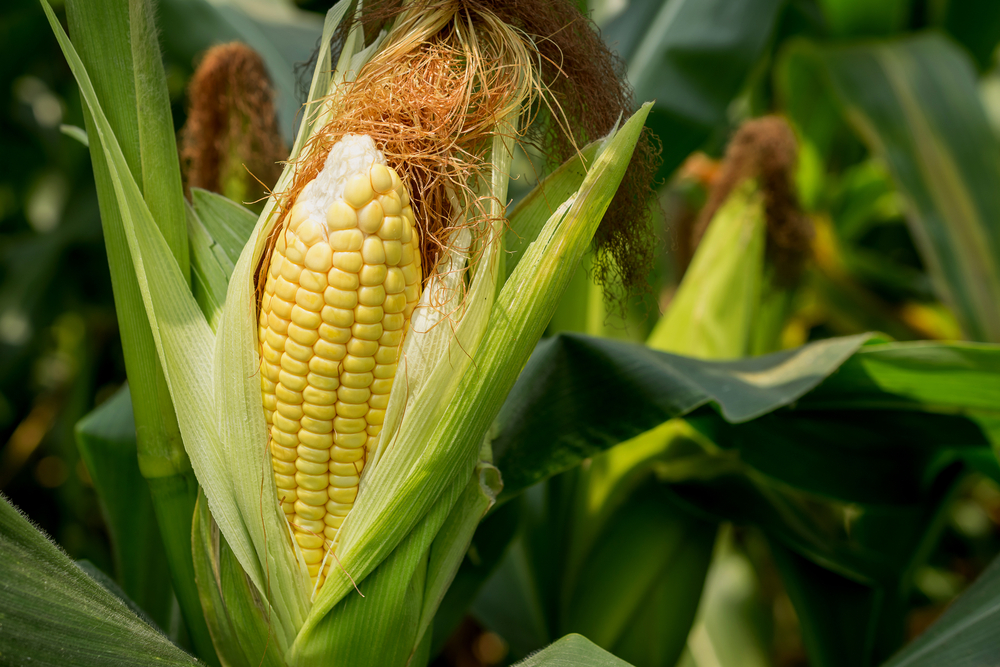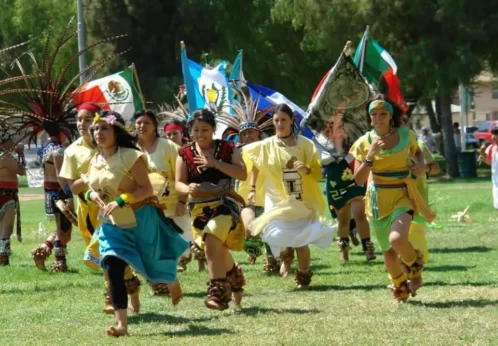Mexico’s president wants to protect his country’s heritage by limiting imports of GMO corn. The U.S. isn’t backing down.

Anet Aguilar traces her passion for corn back to her grandmother.
In the Mexican state of Baja California where Aguilar lived with her grandmother, flour tortillas were popular. Her grandmother Feliza Ramirez was from Mexico City, though, where she grew up milling corn in her neighborhood’s shared mill and forming it into tortillas daily. When Ramirez moved north, she brought the family’s corn tortilla tradition with her.
Corn, the staple food that defines Mexican cuisine and allowed the country’s ancient civilizations to flourish, is now a source of conflict between the United States and Mexico’s current government.
Mexican President Andrés Manuel López Obrador is moving forward with a plan to limit imports of genetically modified corn from the U.S., despite the looming threat of a formal trade dispute.
The plant at the center of the controversial policy — corn — is both a symbol of Mexico’s cuisine and indigenous cultures, and also the biggest cash crop in the United States.

Anet Aguilar (second from right) and other supporters of the Campaña Nacional Sin Maíz No Hay País (National Campaign No Country Without Corn) at a corn festival in Los Angeles, California, in 2013. Photo courtesy of Anet Aguilar/Investigate Midwest.
Mexico is the second biggest buyer of U.S. corn. However, more than 90% of corn in the U.S. is genetically engineered to be resistant to herbicides, insects or both.
“Corn originated in Mexico,” López Obrador said in Spanish in a Feb. 15 speech defending the plan. “It can’t be possible that we have 60, 80 varieties of native corn and we’re allowing the use of genetically modified corn for human consumption.”
The two countries’ respective agriculture and trade representatives have met several times in recent months seeking a compromise.
On March 6, the Office of the U.S. Trade Representative announced it is requesting technical consultations with Mexico under the United States-Mexico-Canada Agreement, the free trade agreement between the two countries signed in 2020.
The next day, López Obrador said the Mexican agency in charge of biosecurity would be studying the health impacts of genetically modified corn.
The two countries have until April 5 — 30 days after the initiation of the technical consultation — to meet. If the technical consultations don’t lead to a resolution, the U.S. could choose to begin another dispute resolution process under the USMCA.
A technical consultation is a method of resolving a conflict involving the Sanitary and Phytosanitary Measures chapter of the USMCA, which deals with biosecurity, health and biotechnology. In order for Mexico’s decree to stand up to challenges under the USMCA, the country’s government will have to prove that importing GMO corn poses a human health or biosecurity risk.
“These consultations represent the next step in addressing the United States’ concerns with Mexico’s biotechnology policies,” U.S. Secretary of Agriculture Tom Vilsack said in a March 6 press release. “While we appreciate the sustained, active engagement with our Mexican counterparts at all levels of government, we remain firm in our view that Mexico’s current biotechnology trajectory is not grounded in science, which is the foundation of USMCA.”
The ties between Mexico’s and the United States’ agricultural systems are longstanding, said Jayson Maurice Porter, a postdoctoral research associate at the Institute at Brown for Environment and Society, who studies agriculture, environmental justice, and racial ecologies in Mexico and the Americas.
American plant breeder Norman Borlaug arrived in Mexico in 1943, sponsored by the Rockefeller Foundation and the Mexican government, where he conducted experiments and research on experimental wheat varieties.
The research gave way to the “Green Revolution” and the widespread adoption of genetically modified crops that increased yields, but required higher amounts of fertilizer and pesticides in Mexico and other parts of the world.

Anet Aguilar (center) at a corn festival in Canoga Park, California, in 2021. Photo courtesy Anet Aguilar/Investigate Midwest.
The U.S. also has long imposed its own specifications for importing agricultural products from Mexico, often putting Mexican farmers at a disadvantage and controlling their access to markets, Porter said.
“The United States is 100% central to all of this,” he said.
López Obrador initially filed the decree in December 2020, planning to phase out imports of genetically modified corn, as well as the herbicide glyphosate, by 2024.
During a Feb. 1 hearing of the Senate Agriculture Committee, Alexis Taylor, USDA undersecretary for Trade and Foreign Agricultural Affairs, said negotiations with Mexico were “productive” and that negotiators were keeping the door open for a formal complaint.
“Fundamentally, our policy is based in science and Mexico’s decree moves away from that principle,” Taylor said.
For Aguilar — a member of the National Campaign No Country Without Corn (Campaña Nacional Sin Maiz No Hay País), which supports the president’s plan — the fight over GMO corn is about preserving the integrity of the ingredient central to her family’s food and cultural tradition.
“Our diet has been changing from the top down,” she said. “We understand, and I understand, that we have to go up and demand change from the top down.”

Agriculture Secretary Tom Vilsack, right, toured drought-stricken corn fields in Iowa in 2012. Photo by USDA via Investigate Midwest.
López Obrador’s decree is “ideological” in nature, said Sofía Ramírez, political scientist and former director of México, ¿Cómo Vamos? (“México, how are we doing?”), a nonprofit organization advocating for economic prosperity in Mexico.
“It’s ideological, because in the Mexican government’s political discourse, and especially with this Mexican president, from the beginning of the administration it was about preserving biodiversity, returning to indigenous origins of consumption of corn,” Ramírez said in Spanish. “From my perspective, that doesn’t make any sense, because nothing is genetically ‘pure’ anymore.”
A 2017 study by researchers at Universidad Nacional Autónoma de México (UNAM), one of Mexico’s largest and oldest public universities, found that the vast majority of tortillas in the country contained traces of genetically modified corn.
The cultivation of GMO corn is strictly regulated in Mexico. All producers who want to cultivate genetically modified corn varieties must obtain a permit from the government, and applications are considered on a “case by case” basis.
The Office of the United States Trade Representative did not respond to an interview request. The U.S. Department of Agriculture referred Investigate Midwest to recent comments by Secretary Vilsack.
Negotiations continue, threat of escalation looms
On Feb. 13, shortly after his administration met with U.S. counterparts, López Obrador announced modifications to the initial decree, extending deadlines for phasing out corn imports and specifying that the ban will only apply to corn destined for human consumption.
Key questions remain unanswered publicly by the Mexican government, such as whether the administration seeks to reserve the right to completely ban GMO corn products in the future, said Angus Kelly, public policy director for the National Corn Growers Association.
U.S. lawmakers and the NCGA have pushed the American government to begin formal proceedings against Mexico under the United States-Mexico-Canada Agreement, arguing that the decree is anti-scientific.
Genetically modified corn is safe to consume, according to the U.S. Environmental Protection Agency, the World Health Organization, the United Nations Food and Agriculture Association, and other regulatory and research organizations.
The safety of glyphosate for the environment, consumers and workers who come into contact with the herbicide is more complicated. While the EPA backs the safety of the product, the International Agency for Research on Cancer has found that the chemical is “probably carcinogenic” to humans. Glyphosate is the active ingredient in Roundup and is banned in certain countries and municipalities around the world.
Countries are supposed to prove the scientific basis for tariffs and other trade limitations before implementing them, Ramírez said. In this case, the Mexican government did the opposite with GMO corn.
She said the decree has the potential to disrupt economic ties between the U.S. and Mexico.
“The Mexican economy is intimately linked with the American economy,” Ramírez said.
On Jan. 30, the U.S. Trade Representative sent a letter to their Mexican counterparts requesting the scientific explanation for the GMO corn ban with a deadline of Feb. 14.
A representative of USTR declined to provide a copy of the Mexican government’s response. The Mexican Secretary of Economy, which prepared the report, did not respond to a request for comment.
Kelly, the National Corn Growers Association public policy director, said corn growers are concerned about what precedent the Mexican decree would set.
“The two problems we have are, one, other well meaning trading partners could follow suit if we allow this crass violation of USMCA to stand,” Kelly said. “Second, it denigrates the American corn brand to say it’s unsafe to eat.”
The impact of the ban on American farmers is hard to understand because of some of the open questions, Kelly said.
For example, yellow corn, the variety that makes up most of the exports to Mexico, is normally used for livestock feed or processed into food additives. While Mexico’s decree plans to transition away from the use of GMO corn in animal food and “industrial use for human consumption,” Kelly said it’s not clear what exactly is considered an “industrial use.”
GMO corn source of longstanding debate in Mexico
Corn has held a central place in Mexican life since long before the Spanish — or the Aztecs — arrived in the basin of Mexico, where Mexico City stands today.
Archeologists have traced representations of corn gods back to most of Mesoamerica’s early civilizations, including the Olmecs, Mayans and Zapotecs.
The indigenous religious tradition of celebrating corn and its role in supporting human life is still present today in many parts of Latin America and the U.S.
Aguilar participates in corn festivals and dances in Los Angeles, California, where she now lives.

Anet Aguilar (left) hosts a live corn nixtamalization on her radio show, Radio Maiz, in Los Angeles, California. Nixtamalization is the process used to prepare corn for use in tortillas and other foods. Photo courtesy of Anet Aguilar/Investigate Midwest.
“Our corn festivals are a way of thanking nature and another year of harvests of corn,” Aguilar said. “That is where I understood that corn was more than just a food that we eat every day.”
Controversy over the planting of GMO corn in Mexico surged in 1996, when the Mexican government approved requests from Monsanto and other agribusiness companies to cultivate GMO corn in the country. Two years later, after public pressure, the government imposed a moratorium on new approvals for the planting of GMO corn.
The moratorium lasted 11 years. Public pushback to GMOs by environmental groups swelled again in 2009, when the moratorium expired.
López Obrador promised at his 2018 inauguration to prevent the planting of GMO seeds in the country.
“We will protect the biological and cultural diversity of Mexico,” he said in Spanish. “We will promote agroecological practices that increase productivity without harming the environment. We will not allow the introduction and use of genetically modified seeds.”
This story was originally published on Investigate Midwest. Investigate Midwest is an independent, nonprofit newsroom. Their mission is to serve the public interest by exposing dangerous and costly practices of influential agricultural corporations and institutions through in-depth and data-driven investigative journalism.Visit them online at www.investigatemidwest.org
My husband & do NOT eat GMO corn–it gives us bellyaches (just like the caterpillars it “controls”). We had to start growing our own corn from organic seeds, or only go to the nearby vegetable stand where they do NOT grow GMO corn (they found the GMO corn was not good for their cows and the milk). We know the pesticides are used for increasing GMO corn production are destructive to butterflies (esp. monarchs), bees, and the birds who eat these insects. If you put out GMO corn, many animals will NOT eat it (rats, racoons, deer, etc.). If you… Read more »
As long as US farm policy is based on quantity versus quality, shortcuts such as GMO’s and glyphosate will be the norm. Don’t blame the farmer. Working with the hand that is dealt by governmental intervention, vested interests supposed “watchdog” groups such as the EPA and WHO, survival is the name of the game and can only be achieved by working around the every existing obstacles coming from those who have never grown anything in life except their resume. The claim of safety for GMO;s is then offset by the admittance of glyphosate be “probably carcinogenic.” Using a fungus known… Read more »
I’m a little confused about some of the context of this article. The main point it emphasizes is that Mexico doesn’t want GMO corn because it doesn’t seem safe. But it seems to me that Mexico may have more reasons to be concerned than just that. For one, Mexico mentions protecting their biodiversity – if imported corn becomes dominant, that could spell monoculture and less cultivation of other species. Imported corn may also threaten their own economic stability by being forced to rely on imports as US corn becomes more and more widespread and undermines the Mexican corn market. Do… Read more »
If Mexico doen not want to pollute its own corn strains with GMO corn, they should not be forced to do so. Tom Vilsack was once a lobbyiest for Monsanto and probably has deep ties with those still affiliated with old Monsanto, now Bayer. May he rot in a very uncomfortable place!
My husband & I do NOT eat GMO corn–it gives us bellyaches (just like the caterpillars it “controls”). We had to start growing our own corn from organic seeds, or only go to the nearby vegetable stand where they do NOT grow GMO corn (they found the GMO corn was not good for their cows and the milk). We know the pesticides which are used for increasing GMO corn production are destructive to butterflies (esp. monarchs), bees, and the birds who eat these insects. The various litigations and successful cases against the companies making these toxic pesticides support the fact… Read more »
I wonder how the US is going to force Mexico to buy GM corn. We know that Monsanto’s profits are at stake. We know that Monsanto owns large share of the US government. Is Monsanto going to force the US government to invade Mexico in order to make them buy the crap corn we grow?
I just wanted to add this:
https://www.cleveland.com/nation/2009/12/monsanto_uses_patent_law_to_co.html
and
https://web.mit.edu/demoscience/Monsanto/about.html#:~:text=Roundup%20Ready%20crops%20are%20crops,and%20farmers%20in%20their%20fields.
That’s all.